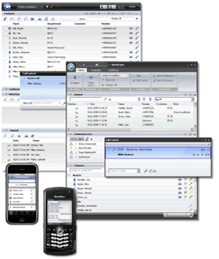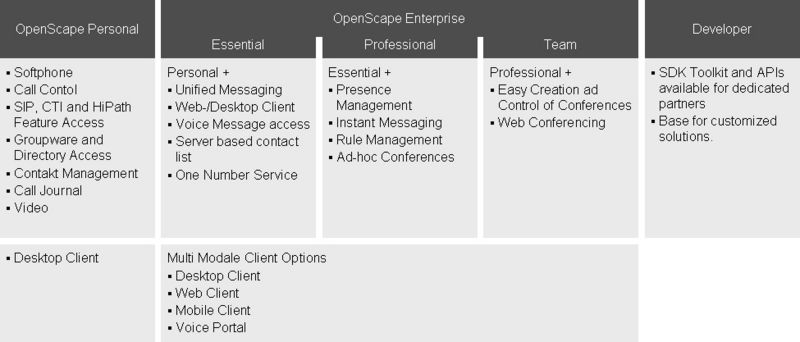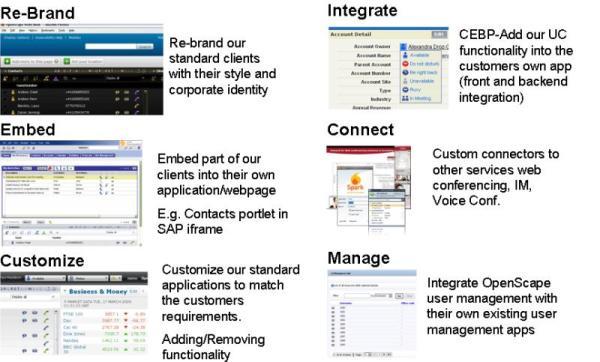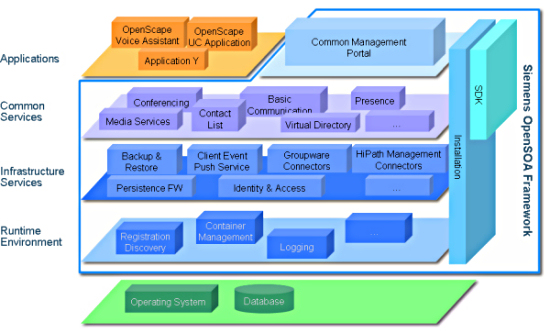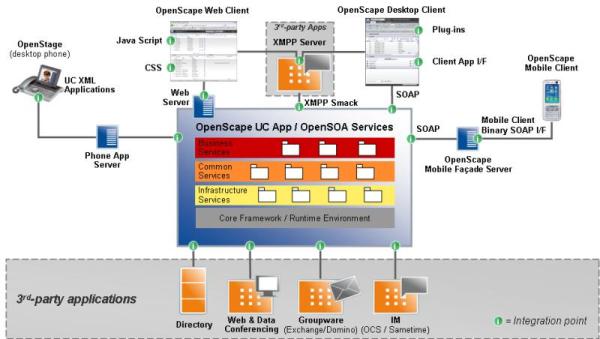Difference between revisions of "OpenScape UC Application"
The Wiki of Unify contains information on clients and devices, communications systems and unified communications. - Unify GmbH & Co. KG is a Trademark Licensee of Siemens AG.
PaulMaddison (talk | contribs) (→Software Development Kits (SDKs)) |
m (→External links) |
||
| Line 114: | Line 114: | ||
== External links == | == External links == | ||
| − | * [http:// | + | * [http://www.unify.com/developerportal Link to OpenScape Fusion Developer Program] |
Revision as of 15:37, 19 August 2010
OpenScape UC Application V3 R1 enhances the capabilities currently sold with OpenScape Enterprise and OpenScape Personal released in 2008.
Contents
The OpenScape UC Application offerings include:
OpenScape UC Application Personal Edition – Client based offering including HFA and SIP for HiPath 4000, HiPath 3000 and OpenScape Voice.
OpenScape UC Application Enterprise – Including Web, Desktop, Voice Portal, and Mobile Clients with targeted sales with OpenScape Voice, and other SIP based integrations
OpenScape UC Application Personal / Enterprise Editions form the core of the Unified Communications Application within the Unified Communications Suite of Unify. These offer various options to organize your company’s communications and increase productivity.
OpenScape Enterprise V3 R1 supports a variety of deployment scenarios for multiple IT and telephony domains. This also includes the capability to support external Web Conferencing and Instant Messaging (IM) solutions. In addition preferred 'partner' solutions are available with Netviewer for Web Conferencing and Open Source Openfire Server as our preferred IM solution.
We are continuing to focus on enhancing OpenScape UC Application to continue our path of removing “overlapping” products. OpenScape UC Application V3 R1 will continue down the path of providing value packaging to our customers ensuring we provide a clear upgrade and migration path to deliver UC functionality based on the needs and roles of our customer's end users.
Highlights:
- Comprehensive presence management for both users and phones
- One Number Service to control availability
- Integrated voice messaging
- Powerful software-based conference management with innovative features
- Support for Windows, web, and mobile clients and provision of a voice portal
- Softphone functionality
- Well-designed user interface that is very easy to use and is harmonized for all clients
- Modular product structure with the option of increasing functionality as needed in steps
- Instant Messaging und Web Conferencing (with 3rd Party Products)
- Video Support
- Integration with Microsoft Office Communications Server 2007 (not released yet)
OpenScape UC Application EE supports geo separated OpenScape Voice installations and redundancy options.
Product Structure
OpenScape UC Application Personal Edition
OpenScape Personal is an IP Softphone for installation on portable laptop and desktop PCs and is the follow-up product for OpenScape OptiClient 130 and OpenScape OptiClient 130 S.
The Personal Edition serves as an entry point into OpenScape UC Application V3 and can be used as a stepping stone for the subsequent deployment of OpenScape Enterprise V3.
The new user interface has the look and feel of Windows® Office 2007 and offers the user a wide range of technical and graphical features that can effectively replace desktop phones entirely. The IP softphone thus provides the ideal solution for normal users who want to eliminate their desktop phones or mobile users who are not tied down to a specific workplace and view their Notebooks as their office.
OpenScape Personal is available in HFA and SIP versions and is installed individually without any server components. The HFA version is designed to operate with HiPath 4000.
The SIP variant, by contrast, is designed to work with OpenScape Voice. With the right preconditions, this version can be upgraded to work with OpenScape Enterprise.
OpenScape UC Application PE has been released for Microsoft® Windows XP and Vista.
OpenScape UC Application Enterprise Edition
OpenScape UC Application EE forms the core of the Open Communications portfolio of Unify. It enables fast and spontaneous access to people and information and thus speeds up decision-making processes while reducing process delays.
Speed is a critical factor in enabling companies to respond to the demands of their customers faster, to market their products rapidly, to quickly exploit specific opportunities and to avoid potential risks and problems. OpenScape Enterprise supports companies in all these areas by providing presence-based real-time communications.
In contrast to the Personal Edition, the Enterprise Edition is also based on a server component. OpenScape UC Application EE offers multiple clients with various access options to meet the different requirements of our customers.
- Desktop Client – with maximum functionality and the most convenient operation for Windows-based clients
- Web Client – for use via a Web browser
- Mobile Client – as a mobile variant for Nokia (Symbian), RIM (Blackberry), Microsoft® Windows Mobile and Apple iPhone 2G & 3G
- Voice Portal – for access to the main OpenScape UC Application EE functions via any phone
The Mobile Client has been tested and released with the following mobile devices:
- Blackberry 8100 (V4.2.1)
- Blackberry 8820 (V4.2.2)
- Nokia E61i (Symbian S60 3rd Edition)
- Nokia E65 (Symbian S60 3rd Edition)
- Nokia E51 (Symbian S60 3rd Edition)
- HP iPAQ hw6940 (Windows Mobile 5 Phone Edition)
- HP iPAQ 610 (Windows Mobile 6 Professional)
Software Development Kits (SDKs)
Accelerate your organization’s business processes with OpenScape advanced unified communications Delivering on our Open Communications promise SEN has put an even stronger focus on further expanding the richness, scope and support of our open interfaces for addressing the full breadth of custom integration and solutions all the way from basic re-branding, basic click-to-call, advanced Communications Enabled Business Processes (CEBP) integration to the creation of completely new applications (e.g. for OEMs).
OpenScape UC Application / OpenSOA SDK
The OpenScape UC Application’s OpenSOA SDK is the most comprehensive and feature rich of our SDKs. Designed to be easy to learn and use it exposes the extensive collection of distinct Web Services and APIs, each service encapsulating a key UC feature area, such as Call Control, Conference Management, Presence, Contact Management, Tell-me-when, User Device Management and user provisioning (via an SPML interface) and more. All services have their own defined and well documented interface accessible via SOAP/XML providing a more powerful and flexible approach to creating customized solutions by combining individual Web Services to match the needs of the integration project.
One example of an OpenSOA service is the Basic Communication service. It is responsible for providing the functionality needed to control the voice communication capabilities of OpenScape UC Application. There are many other services, like Virtual Directory Service Presence Service or Authorization Service, each provide themes of functionality that are used by the OpenScape UC Application and can be accessed through the SDK.
Powerful and feature rich integrations can be achieved by combined and blending the functionality of the wide range of services offered. Service can be used (consumed) by client applications or other services. Multiple applications and services can access an OpenSOA service in parallel. The interfaces to these services are what make up the OpenScape UC Application SDK. The functions that are opened to external applications are well documented and may be associated with specific governance rules to ensure responsible and secure usage.
Even though all OpenSOA Services are technically available and accessible today the OpenSOA SDK will gradually ‘open-up’ these interfaces to customers and partners providing the appropriate documentation, sample code and tools.
The OpenSOA SDK is aimed primarily at Professional Services organizations and selected System Integrators (this includes customers with ‘SI skilled’ IT departments). To find out more about the OpenSOA SDK visit the OpenSOA SDK - Deep Dive section.
OpenScape UC Application Web Client SDK
In addition to the OpenSOA SDK the OpenScape UC Application Web Client SDK enables a user to change the appearance of the web client and its portlets according to the customers’ wishes/brand requirements. The Web SDK also allows common UC functionality to be embedded quickly and easily into other web applications via Java Script. Further information regarding the Web Client SDK can be found in the OpenScape UC Application Web Client SDK - Deep Dive page.
OpenSOA SDK for custom OEM Applications
Unify OpenSOA Framework is a standards-based implementation of a Services Oriented Architecture (SOA) used within the entire OpenScape UC Application Suite and other SEN product portfolio elements. The architecture is optimized to allow the easy re-use of software assets. These software assets are structured in such a way that specific themes, e.g. Communication or Presence, are grouped together in single services. Complex functionality can be easily achieved by using combinations of these services to create a fully featured solution.
Not only does the OpenSOA SDK allow the cost effective development of UC enabled solutions it also allows taking advantage of important non-functional features of the OpenSOA Framework – for example scalability, reliability and security.
A perfect example is the 2007 OEM agreement with IBM® that allows IBM® to license elements of Unify' OpenScape open unified communications capabilities to enhance the IBM Lotus® "Unified Telephony" offering currently planned by IBM as part of the expanded Lotus® Sametime® product family.
See also
- OpenScape UC Application Web Client SDK - Deep Dive
- OpenScape UC Application Web Client SDK Customization Examples

